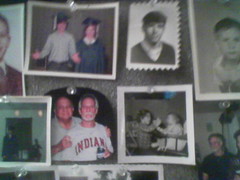
We all gathered at a funeral home in Elkhart on Saturday afternoon to welcome wellwishers, friends and family alike. At one point I stepped outside for some fresh air. It was a lovely spring day.
I noticed an older gentleman ride up on a bicycle. Even from a distance of 30 paces he looked rundown. He struggled to chain his fancy red mountain bike to a tree, and he stumbled as he approached the front door. I offered my hand to shake. "I'm Mark's nephew," I said.
He told me his name was Richard, but Mark knew him as "Bud Man."
He sported a crewcut and he was missing quite a few teeth. His arms were covered with crude blue tattoos, the kind you get in jail, and they'd grown blurry in his aging skin. One was of a naked woman, another was of a pointy knife. On his right arm was written, "I love to pop."
He told me he was beside himself with grief; he'd been sulking and drinking all day. "Mark had a good heart," he said. "He was my best friend." I would hear many people say the same two sentences all weekend -- people I doubt anyone in my family had ever met.
To Richard, Mark was a protector of sorts. "I like to fight," he explained. "And when I'd get mad at somebody Mark would say, 'They ain't worth going to jail over.'
"I usually listened to him," Bud Man added, smiling. "But not always."
We went into the funeral home and I introduced Bud Man to one of my aunts. After she politely shook his hand, she whispered to me to keep him away from my grandfather. All day Mark's friends came through the funeral home, and several of us younger members of the Minichillo clan were assigned the task of running interference. They were easy to spot by their clothes, hairstyles and teeth, and they were all friendly and very, very sad.
We paused for a while at the collage of photos, and the images triggered memories for Richard. By and by I learned that Richard had been to jail a couple of times, once for manslaughter. He'd killed a man in a bar fight back in the 1970s and got twenty years, though he was released after ten. When I asked him what the "love to pop" tattoo was about, he said, matter-of-factly: "Oh, cherries."
"Mark said to me he knew I ain't a bad guy," Richard added. "He says people should know if they mess with some people they'll get what they get."
I introduced him to another aunt and he told us a story. He and Mark were in a bar, and Mark didn't believe Bud Man was blind in one eye, so Richard pulled his eye out of his socket to prove it. Mark about fell off his bar stool in shock, Richard said. It was one of the better bar stories I'd heard about Mark, but not the best. The best came from my aunt Lora, a day later.
We wandered over to the guest book and Richard signed "Bud Man" in shaky cursive.
I lingered with him for a while on the front steps of the funeral home. He said for the fourth or fifth time that Mark was his best friend. I doubted that Mark would have agreed, but I'm sure Richard was sincere.
I thought again about the measure of a man's life. I think we all thought at various times that Mark was a failure, and by our standards he might have been. He lived with his dad when he died, unemployed, with no real wealth to his name. But to Richard and the other forlorn friends who stopped by the funeral home on Saturday he was a pillar of the community. A kind heart. A best friend. A foil against jail, or manslaughter.




No comments:
Post a Comment